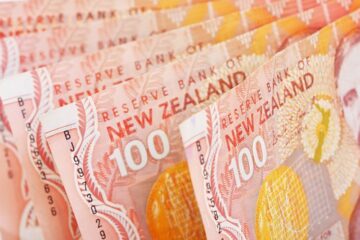Tom Lee remembers the three days of horror all too well
It was in early August when Japan’s Nikkei 225 nosedived straight into its worst day since the 1987 crash.
Related: Fed Chair Powell gives clearest signal yet on path of interest rates
“There were three days of horror as the market, post-FOMC, all the way to that Tokyo Black Monday,” Lee, head of research at Fundstrat Global Advisors, said in an Aug. 22 interview on CNBC.
“It was gut wrenching,” he said. “But we viewed this ultimately as being a growth scare because we didn’t think the U.S. was entering recession which a lot of people thought after that jobs report.”
On July 31, Federal Reserve Chairman Jerome Powell set the stage for the central bank’s first rate cut in four years, citing greater progress toward lower inflation as well as a cooler job market that no longer threatens to overheat the economy.
Nevertheless, the Fed kept its key interest rate unchanged at a 23-year high of 5.3%, with Powell saying that if inflation continues to fall, “a reduction in our policy rate could be on the table” when the Fed next meets Sept. 17-18.
(On Aug. 23 Powell dropped his strongest hint to date that the central bank is prepared to lower its benchmark lending rate.)
Tom Lee, head of research at Fundstrat Global Advisors
TheStreet / NYSE / Tom Lee
Analyst Lee: ‘Tech is in good place’
Investors had also received a downward revision of federal job growth estimates over the 12 months ended in March, where the government’s payroll employment data had been over reported by 818,000 between April 2023 and March 2024.
“I think people thought there was systematic risk because of the ‘what’s going on with the yen,’ but markets showed a lot of resilience since then,” Lee said. “I mean, the fact that we snapped back so sharply is showing you how strong this market is.”
Related: Analyst resets Nvidia stock price target before earnings
Powell took the stage at the central bank’s annual retreat in Jackson Hole on Aug. 23 with renewed confidence that the economy is poised, albeit delicately, for a soft landing — easing inflation with no recession.
Minutes of the Fed’s July policy meeting on Aug. 21 showed a clear shift towards the “full employment” side of the central bank’s mandate.
The minutes indicated that a “vast majority” of Fed officials “observed that, if the data continued to come in about as expected, it would likely be appropriate to ease policy at the next meeting.”
Lee said the minutes showed the Fed staff saying this is a strong labor market, while the jobs report and the subsequent revisions “show a lot of jobs disappeared.”
“It’s not as strong a market and I think it gives more ammunition for the Fed to start a cutting cycle and that’s going to give a lot of life to the economy and to the markets — especially cyclical stocks and small-cap stocks,” he said.
The Russell 2000 finished Friday up 3%.
Lee said “tech is in a good place” because of artificial intelligence and AI-chip giant Nvidia (NVDA) “should reinforce that.”
“It’s not a demanding multiple,” he said. “Maybe 28 times forward earnings, which is for one of the most important companies in the world it’s not a high multiple. So if tech is in a good place and then we get Fed cuts it I think it allows the overall market to expand.”
Nvidia reports for its fiscal second quarter on Aug. 28.
Job market hinges on Fed, Lee says
Lee said the probabilities of a soft landing were going up and “that’s why this should be a benign cutting cycle” that’s good for markets.
“But I think the key is the Fed getting off data dependence because data dependence is the reason they missed the inflation turn and I think now they’re missing the soft landing,” he added.
Futures markets are showing more than two cuts, Lee said, “so I think the Fed probably is a little behind the curve and we know there is a recession in housing and durables and auto sales so there was a lot of pain out there.”
More Wall Street Analysts:
Analysts reboot Grand Theft Auto maker’s stock price targetAmerican Express stock analyst flags concerning shift in consumer behaviorAnalyst resets Nvidia stock price target before earnings
“So, cutting more aggressively would actually make sense, at least from the markets perspective,” he said.
Lee noted that unemployment is greatly affected by how the Fed communicates to CEOs “because a lot of companies are cautious right with monetary policy this tight and real rates this tight.”
“It makes them reluctant to expand, and so the job market itself kind of hinges on what the Fed is doing,” he said, “and once the job market starts seeing unemployment rise, they could get bad.”
Lee said rising gold prices show “there’s still a lot of fear out there” as “gold is almost a measure of the bearish sentiment.”
Tom Lee on the November election
Turning to politics, Lee said that markets believe that former President Donald Trump’s probabilities of winning the November presidential election against Vice President Kamala Harris are stronger than the polls are showing.
“I think when the market becomes more convinced of that … you’ll see cyclical stocks do better, small caps, bitcoin do better because these are really clear policy differences.”
Nearly half the corporate money flowing into the election has come from the crypto industry, according to a report from the nonprofit watchdog group Public Citizen.
Trump said last month at a bitcoin conference in Nashville that if he were returned to the White House, he would ensure that the federal government never sells off its bitcoin holdings.
“I think over the last couple of days to me the market seems like it’s betting on Trump’s odds being better than the polls,” Lee added.
Related: Veteran fund manager sees world of pain coming for stocks


